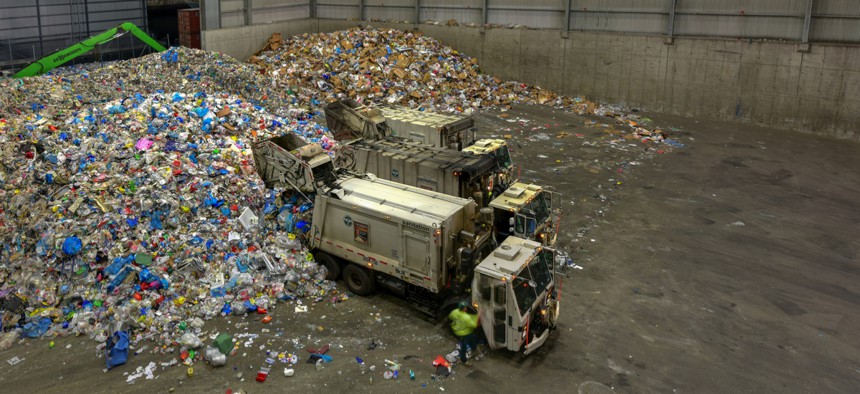N.Y. State Wants to Help Its Municipalities With Recycling Strategy

Shutterstock
Amid China’s new restrictions on recycling imports, Gov. Cuomo wants a better game plan for waste management in the Empire State.
New York Gov. Andrew Cuomo announced Monday that he’s directed the Department of Environmental Conservation to hold multi-stakeholder meetings to identify strategies for how the state and its municipalities should respond to big shifts underway in the global recycling market.
"Our recycling programs are putting thousands of New Yorkers to work in the state's green economy, while cutting the greenhouse gas emissions that cause climate change and protecting our environment," Cuomo said in a statement. "For 30 years, New Yorkers have proven the power of conservation, and these actions will jumpstart even more efforts to support and expand municipal recycling programs across this great state."
The challenge that officials in New York and elsewhere across the nation face with recycling: the volatile market conditions due to China’s tightening controls on imports of recyclable materials.
As Route Fifty recently featured, waste managers and local officials in cities across the U.S. are in a waiting game to see how that global volatility may impact their own recycling programs.
“The recycling industry in the U.S. has not kept up with innovation,” Peter Kwon, a council member in the city of SeaTac, Washington, told Route Fifty in an interview. “It was a market problem. All those empty shipping containers going back to China after delivering consumer goods here—it was very cheap to send the recycling material over to China. So now we have to ramp back up. And we’re very early in that process.”
The challenge is being acutely felt in and around Albany, New York. According to the Times-Union:
In June, County Waste, a private company that operates the region's largest "single-stream" recycling center in Albany, announced it would charge $120 a ton for such waste. That is roughly twice as expensive as disposal of regular household waste Albany city officials are now negotiating with County Waste for a new contract on behalf of the Capital Region Recycling Partnership, which includes the city and 12 other localities that cover nearly 220,000 people in Albany and Rensselaer counties. Albany alone could face an additional $400,000 in expense to cover its recycling program.
What’s New York state’s path forward? In the near term, there are the cross-sector discussions led by the Department of Environmental Conservation—the inaugural meeting is set for Aug. 29 at DEC headquarters in Albany.
Long-term, New York hopes to “capitalize on the high supply of low cost recyclable materials that can serve as raw materials supply for future manufacturing that has been historically moving to other countries,” according to the state’s announcement.
And that’s something that could fuel new homegrown industries. “The current recycling depression can be transferred to a recycling renaissance through creative and cooperative partnerships with businesses, citizens, and elected officials and we look forward to working with the state on this new initiative," Dereth Glance, executive director of Onondaga County Resource Recovery Agency, said in the state’s announcement.
"DEC is working with recycling industry stakeholders, municipalities, academic institutions, and others to develop short- and long-term actions to sustain recycling markets in New York, improve the quality of recyclable materials, and increase flexibility for recycling facilities. To support recycling here at home, New Yorkers can do their part to reduce contamination in our recycling supply chain by following our tips to recycle right," DEC Commissioner Basil Seggos said in a statement. "DEC encourages all communities to continue recycling and to contact us if they are experiencing difficulties adapting to changes in global recycling markets."
Michael Grass is Executive Editor of Government Executive’s Route Fifty and is based in Seattle.
NEXT STORY: Instead of Razing Buildings, Some Cities Want to Reuse Their Bones






